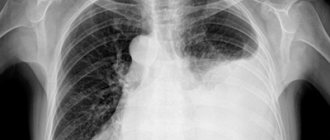Fainting (an outdated medical name is syncope) is a condition characterized by loss of consciousness and a drop in blood pressure. Metabolism slows down, sudden weakness and confusion occur. Fainting can last from a few seconds to tens of minutes.
In most cases, fainting is caused by a sudden decrease in metabolism in the brain, cerebral circulation is disrupted, and the brain stops receiving enough oxygen. Despite the fact that the brain does not function at full capacity, basic vital functions are reduced, but do not disappear completely. The patient is breathing, the heart is working.
Loss of consciousness can be caused by a variety of diseases. Sometimes fainting occurs due to a coincidence of circumstances - fatigue, stuffiness, prolonged fasting.
Before fainting, there is always a pre-fainting state, which can also last from a few seconds to several minutes. In some cases, it is enough for the patient to sit or lie down and relax the collar to avoid fainting.
Presyncope is characterized by the following symptoms:
- pulsation in temples;
- difficulty breathing - a subjective feeling of lack of oxygen;
- increased sweating;
- feeling of heat throughout the body;
- nausea, dizziness;
- tachycardia, feeling of rapid heartbeat;
- the appearance of dark spots before the eyes.
If the patient fails to sit down, he faints. In most cases, patients quickly come to their senses without outside help (although this does not mean that it does not need to be provided). Sometimes after fainting, other unpleasant symptoms are observed, for example, trembling and involuntary twitching of the limbs, the urge to urinate.
At CELT you can get advice from a neurologist.
- Initial consultation – 4,000
- Repeated consultation – 2,500
Make an appointment
Causes of fainting
There are several physiological reasons that can lead to short-term loss of consciousness. Let's look at some of them.
- Disturbances in the functioning of the autonomic nervous system. This system is responsible for vascular tone. If there is a malfunction, it cannot correctly give commands to the vessels, they contract sharply, and loss of consciousness occurs. This is the main cause of neurogenic fainting - the most common fainting.
- Diseases of the cardiovascular system. They are the cause of the so-called. cardiogenic syncope. The heart does not work well enough, the blood vessels narrow, which leads to brain hypoxia.
- Atherosclerosis and vascular diseases. This also includes ischemic attacks and strokes.
- Increased intracranial pressure. It occurs as a consequence of certain diseases - a tumor, congenital hydrocephalus, or against the background of cerebral hemorrhage, as well as after head injuries.
- Decreased blood glucose, decreased oxygen concentration in tissues. Such conditions occur with diabetes, anemia, kidney and liver failure.
- As a result of a decrease in the volume of fluid circulating in the body. May be the result of bleeding, diarrhea, or other excess fluid loss.
- Poisoning by toxins: carbon monoxide, ethyl alcohol and others.
- As a result of various psychological and psychiatric diseases. For example, with neuroses and anxiety, a common symptom is hyperventilation. The body tries to control the oxygen content, which leads to vascular spasm. In such cases, patients need to learn breathing techniques.
There are other reasons: infectious diseases, traumatic brain injuries, epilepsy attacks. In each individual case, it is necessary to undergo an examination to find out why fainting occurs.
If this is an isolated case, and there were no pathologies during medical examinations before, there is no need to worry. But if fainting recurs, you need to visit a neurologist.
First signs
The following are signs that precede syncope:
- causeless anxiety, weakness, incessant yawning, heavy breathing;
- pale skin, sweating;
- headaches that bring a pressing or squeezing sensation, noise in the ears (ringing in the ears may be present), dizziness, hearing problems, suffocation;
- adrenaline rush, accompanied by heat at the end of the fingers;
- darkening before the eyes;
- tonic convulsions;
- a sharp increase or decrease in pressure, heart rate increases;
- nausea, vomiting, sour taste in the mouth.
Fainting is characterized by the presence of the following manifestations:
- the muscles are relaxed and the body is motionless;
- breathing slows down;
- blood pressure decreases;
- in case of deep fainting, the occurrence of convulsions and incontinence cannot be excluded;
- Pupils dilate, in the presence of serious pathologies, there is no reaction to light.
Types of fainting
The classification of fainting is based on the causes of loss of consciousness. There are three main types of fainting:
- neurogenic;
- cardiogenic;
- hyperventilation.
Among neurogenic syncope, in turn, a distinction is made between vasodepressor and orthostatic. The first ones are the most common, usually occurring in fairly young patients in stuffy conditions, stress, fatigue, or lack of nutrients.
Orthostatic fainting occurs when there is a sudden change in body position (usually during a sudden rise or standing). It may also be caused by taking certain medications.
Cardiogenic loss of consciousness occurs when the heart rhythm is abnormal and can accompany a heart attack. Cardiogenic syncope accounts for up to a quarter of all cases of loss of consciousness, especially among the elderly population.
Hyperventilatory syncope occurs due to rapid breathing. This symptom is characteristic of panic attacks and anxiety attacks. Sometimes this condition is called a vegetative crisis.
How does loss of consciousness occur?
The person becomes ill, he rolls his eyes and loses consciousness, gradually sinking to the floor. It is very rare for a victim to fall as if knocked down. This will indicate the presence of other health problems. In any case, it is better to undergo a comprehensive examination, starting with a neurologist.
Fainting is not a sign of illness. For example, they are observed in completely healthy pregnant women when they see some food product. Therefore, everyone should understand how to behave if someone nearby faints. If you don’t know this and don’t understand the principles of correct behavior, then at the sight of a fainting state you can fall into a panic and, instead of helping, harm the person.
Who suffers from fainting?
So, most often, fainting is caused by a lack of oxygen supply to the brain. This process is sometimes called oxygen starvation. If we look at the statistics of fainting states in people of different groups, we will notice that it is impossible to single out a specific group based on any criterion.
The following are susceptible to fainting:
- men and women;
- people of all age categories.
Professional affiliation also does not determine the leading group in terms of fainting conditions. Sometimes people faint, for example, from fright or blood, as well as stuffiness or the sight of a spider. It is clear that these situations have nothing in common.
Clinical picture
Fainting is characterized by rapid development. Loss of consciousness occurs rapidly. Sometimes patients don’t even have time to realize that something is wrong. In other cases, typical symptoms of presyncope are observed.
Fainting is characterized by the following clinical manifestations:
- lack of consciousness;
- weak pulse;
- decreased breathing rate (bradypnea);
- lack of pupillary reaction to light;
- the patient comes to his senses within 1-5 minutes (if fainting lasts longer, this is serious);
- after fainting, pallor and weakness persist;
- for some time afterward, low blood pressure is observed;
- Dizziness and nausea may occur.
In most cases, syncope occurs when the patient is in an upright position. If the patient loses consciousness while lying down, then it is necessary to suspect a serious somatic pathology.
Symptom treatment
General and biochemical tests, ECG, EEG are performed as diagnostics. For patients with syncope, differential diagnosis is required.
In some cases, no specific treatment is required. Otherwise, the doctor selects therapy depending on the primary ailment that caused the loss of consciousness.
Symptom during pregnancy
Pregnant women can also lose consciousness, which is considered a common occurrence. This is due to the fact that the blood flow in their body is completely redistributed. By the way, loss of consciousness is considered one of the very first symptoms of pregnancy. The situation is aggravated by emotional instability, hormonal changes, heat outside and at home. This provokes a decrease in blood pressure, which leads to fainting.
Treatment at home
Treatment depends on the causes of fainting, that is, the diseases that cause it. At home, you must strictly follow all doctor's recommendations. It is recommended to remain in bed, perform therapeutic exercises, and take vitamin and mineral complexes to strengthen the body.
Diagnostic measures
MRI of the brain
- Cost: 14,000 rub.
More details
Diagnosis begins with an initial appointment with a neurologist. First, the doctor will try to find out in what circumstances, under the influence of what provoking factors, loss of consciousness develops. To establish a final diagnosis, you will need to undergo a series of instrumental examinations.
Thus, if cardiogenic fainting is suspected, the patient is referred for an ECG, echocardiography, and also for consultation with a cardiologist. If epilepsy is suspected, an electroencephalogram is performed. It is also common to take a blood sample to check blood sugar levels to rule out hypoglycemia. If anemia is suspected, it is necessary to conduct a blood test for hemoglobin content. If there is a possibility of neurological or organic diseases of the brain, then MRI and/or vascular examination are prescribed.
Treatment is carried out on an outpatient basis; it is enough to undergo an examination and receive treatment prescriptions.
Diagnostic features
A patient with frequent occurrences of syncope is examined in the hospital using an ECG to refute or verify that such a condition is cardiac in nature. During the diagnosis, the following conditions are noted:
- If a patient is under forty years of age and has no abnormalities in the cardiac structure on the cardiogram, then syncope is most likely caused by the presence of neurological disorders.
- If a patient over forty years old has no lesions on the cardiogram, then the examination still begins with a detailed study of the condition of the heart.
In addition, you need to know the following:
- syncope caused by physical overexertion is not safe for people of any age group;
- the older the patient who experiences syncope, the greater the likelihood of having serious cardiac problems that caused this type of condition;
- if the duration of cardiac interruptions to the point of fainting is more than 5 seconds, then such interruptions are signs of serious heart disease;
- uncontrolled muscle twitching is quite often caused by temporary cerebral ischemia caused by the presence of heart disease;
- Even short syncope if a person has heart disease is usually considered a serious symptom.
It is especially dangerous if syncope is accompanied by the following factors:
- painful sensations behind the chest;
- in 60 seconds more than 160 heart contractions;
- heavy sweating;
- slow heartbeat;
- low pressure.
First aid for fainting
It is important to know how to provide first aid if you lose consciousness.
- The patient must be placed on his back with the lower extremities elevated.
- Unbutton your collar, loosen your tie, remove your scarf, and provide fresh air.
- To speed up the return to consciousness, you can sprinkle the patient with cold water. For the same purposes, it is recommended to use ammonia.
If the patient does not come to within 2-3 minutes, you must call an ambulance. With prolonged fainting, even after returning to consciousness, the patient may experience some dysfunction.
Fainting should be treated by qualified professionals. Neurologists at the CELT clinic are ready to carry out all the necessary diagnostics and prescribe the most effective treatment. Modern equipment and highly qualified doctors are the key to patient health.
Make an appointment through the application or by calling +7 +7 We work every day:
- Monday—Friday: 8.00—20.00
- Saturday: 8.00–18.00
- Sunday is a day off
The nearest metro and MCC stations to the clinic:
- Highway of Enthusiasts or Perovo
- Partisan
- Enthusiast Highway
Driving directions
Recommended Actions
If you see a person starting to lose consciousness, try to prevent him from falling and hitting his head.
It is necessary to ensure a sufficient volume of blood flowing to the brain. What instinctive reaction occurs when a person loses consciousness? Of course, I want to help him. And if he is lying down, there is a desire to put something under his head, but this is extremely contraindicated in the condition described. The fact is that when you raise your head, blood flows out of it. Thus, a person needs to be laid so that his head is at least at the level of his body, and maybe lower.
You can raise your legs, and then the flow of blood from the limbs to the head will begin. Many people advise leaving the unconscious person alone, letting him lie down, and he will come to his senses. However, if patting the cheeks does not help, it is best to call an ambulance without leaving things to chance. The victim may need immediate medical attention.
Prevention
What should you do or what should you worry about if you encounter such a problem? If fainting becomes more frequent, then, of course, first of all you need to consult a neurologist.
It is equally important to understand what conditions or situations lead to fainting. There are general tips that need to be followed. It has been noticed that most often fainting occurs in a stuffy room or in the open sun. It is important to avoid such situations. Drink as much water as possible, this will also prevent you from fainting. Therefore, everything is in your hands. Take care of yourself and your condition, and you will experience fewer unpleasant situations.
If you experience frequent fainting, you should consult a neurologist. Make an appointment in Chelyabinsk by calling 240-03-03 or on our website.







